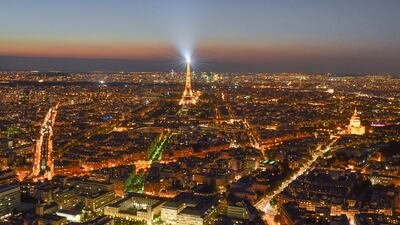A huge majority of people living in the Paris region want the city, known as the “City of Lights”, to have fewer lights.
The Eiffel Tower and its famous lights shine a beacon around the world and have helped make Paris one of the world's most popular tourist destinations.
Wide avenues are lined with street lamps, art installations come with spotlights and at Christmas all the extra lights mean Paris stands out, even from space.
But for locals, the high-intensity lights are too much — 95 per cent want a dimmer switch.
They want the “invasive” night-time city lights turned down, and some are starting to talk of an off switch for some of the lights.
The study, carried out by the Paris Region Institute from April to July 2021, asked 2,778 residents of Paris and the wider Île-de-France region what they thought of the lighting.
And the people for whom the City of Lights is home did not hold back.

Eighty-two per cent of Parisians said the never-ending light was preventing them from seeing the stars.
And 83 per cent complained that public night lighting was shining into their bedrooms.
Nearly 65 per cent said they suffered negative health effects because of sleeping problems linked to the lighting.
“The number of light points has increased by 85 per cent in 25 years,” said Nicolas Cornet, an ecologist at the Paris Region Institut.
“With the arrival of LEDs, which are more economical, many local authorities are adding lighting where there was none before.”
Regulations have brought in some changes to light levels but for many in the study it is too little, too light.

France’s Ministry of Ecological Transition described the excess of artificial lighting as “a waste of energy”.
It also said such lighting was a source of disturbance for biodiversity and the food chain.
The institute said its study was necessary to determine the link between public light and social issues including health, energy, the night-time environment and the impact on biodiversity.
In May 2019 a report by the National Agency for Health Security highlighted the biological impacts of light on human health and its impact on circadian rhythms — which it said required “a significant intensity of light during the day and total darkness at night”.


